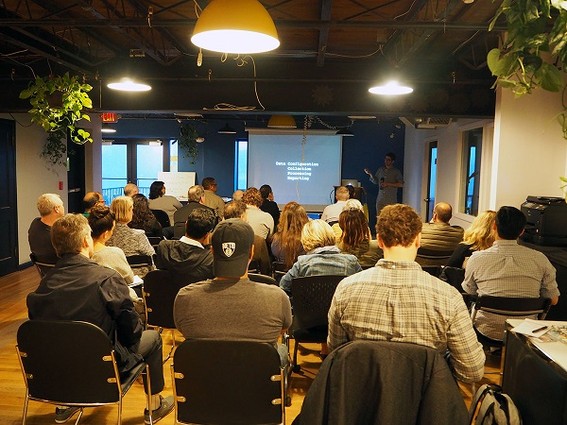Fricovsky Unveils the Mysteries of Google Analytics at Jersey Shore Tech Meetup Talk

Bret Morgan, cofounder of Jersey Shore Tech Meetup, Cowerks and Asbury Agile (all based in Asbury Park), started off Thursday night’s Jersey Shore Tech meeting, titled “Google Analytics for Those Who Care,” with two simple questions: “How many of you use Google Analytics for what you do? Now how many understand Google Analytics?”
All 45 attendees raised their hands in response to the first question, but a majority dropped their hands in response to the second. This impromptu poll demonstrated why many current business professionals are trying to learn more about Google Analytics.
Metrics that offer insights into how effectively a site functions for end users or customers are essential for anyone trying to sell a product. Those answers are all in the numbers. As a majority of businesses rely on Google Analytics for those numbers, there is an increasing need for instruction in the tool.
Kevin Fricovsky, chief architect of Web strategy and development for Broadway.com and BroadwayBox.com (both in New York), based his presentation that night on his own observations as a programmer and project manager. He also a cofounder of Jersey Shore Tech Meetup and Asbury Agile.
Start with the Basics
Google Analytics can be a big, unwieldy beast. Fricovsky’s advice is to take your time and keep it simple.
“Keep in mind some simple tips before jumping into the more complex. Use the search bar to find what you’re looking for, explore the provided tutorials, take advantage of the online classes on the Analysis Academy. Notifications in the top right corner offer insights into recent updates,” he said. “And don’t forget that Google Analytics is constantly publishing useful tips on their Twitter handle, @googleanalytics.”
Fricovsky went on to describe a few methods for tracking user behavior, and for implementing certain code-level integrations along the way.
Exploring Google Analytics
Segmenting website traffic is helpful when it comes to targeting certain demographics for marketing. Seeing whether there are correlations between, say, mobile traffic and conversion numbers, could indicate if you need a website redesign.
Google Analytics has a “Page Extension” available for downloading. “It’s really helpful if you want to see performance numbers while bouncing around the site as if you were a user,” Fricovsky noted.
Keeping Everyone in the Loop
If someone on your team wants to know a certain metric, you can set up daily or weekly PDF reports to be sent via email. This is a useful tool for team members who need consistent updates.
Setting up alerts for when “404 errors” or “conversions” hit a certain threshold could help with addressing these issues in a timely fashion.
As Google Analytics users progress through different settings, they should save them as “Dashboards,” said Fricovsky. This allows people to go right back to the view they were using or even send a shareable link to others who need the information. Ultimately, when working with a team or trying to problem solve, being able to share exactly what you are looking at can help foster a tremendous amount of communication.
Treat It Like a Science Project
To find the most accurate numbers, use Google Analytics as if you were conducting a science experiment. With the scientific method, good notes, and a little bit of patience, users can gain a better understanding of a specific topic.
“A/B testing the content on your site is the best way to analyze your site from the point of view of the user.” Fricovsky said. “Basically, you get to find out what the user wants through the numbers you find on Google Analytics.”
A/B testing entails comparing two versions of a Web page to see which performs better. By showing similar website visitors two different pages at the same time, you can better understand what users want and how they think.
Making Improvements
Robin Bhattacharyya, owner and head developer of Carponents.com (Brick), attended Thursday’s meetup and expressed how important Google Analytics is to his business. “[Google Analytics] really helps my team adjust our marketing efforts, instead of wasting time on something that doesn’t work,” he said. “It takes some time to learn, but that’s why meetups like this speed up the learning process.”
While the presentation offered a lot of information and ideas, Fricovsky admitted that it only scraped the surface. “There are so many different tests you can try in Google Analytics, and I tried to offer as many as I could within the two hours I had tonight,” he said. Fricovsky then expressed an interest in offering some follow-up workshops on Google Analytics at Cowerks over the coming months.
“Coming off of a two-year expansion project, we now have space to host a lot more workshops and classes, as well as bigger groups of over 50 people,” Morgan said.
Given the number of ecommerce-site owners, marketers, programmers and sales representatives in attendance at Thursday’s meetup, there appears to be a demand for more educational offerings on how to use Google’s dynamic tool.

